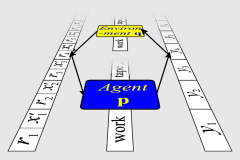

Advanced Topics in Artificial Intelligence COMP4620/COMP8620 |
 |
 |
| # | Week | Lecture / Tutorial / Lab |
|---|---|---|
| to be updated throughout the course | ||
| 1 | 24Jul - 28Jul do self-evaluation (solution) |
Overview & Introduction [Advertisement] [Slides] Reading:[Legg08.Chp.1] |
| 2 | 31Jul -4Aug get assignment 1 |
Information Theory & Kolmogorov Complexity [Slides] Reading:[UAIBook.Sec.2.2] Tutorials |
| 3 | 7Aug - 11Aug | Bayesian Probability Theory [Slides] Reading:[UAIBook.Sec.2.3] Algorithmic Probability & Universal Induction [Slides] Reading:[UAIBook.Sec.2.4] No tutorials |
| 4 | 14Aug - 18Aug | Minimum Description Length [Slides] Optional Reading:[MDL.Chp.1] Universal Similarity [Slides] Optional Reading:[USM] No tutorials. No lecture on Thu.17.Aug |
| 5 | 21Aug - 25Aug | Tutorials (only). No lectures |
| 6 | 28Aug - 1Sep | Bayesian Sequence Prediction [Slides] Reading: Parts of [UAIBook.Chp.3] Context Tree Weighting [Slides] Reading:[CTW] Tutorials |
| 4Sep - 15Sep | break | |
| 7 | 18Sep - 22Sep hand in assignment 1 get assignment 2 |
Universal Rational Agents
[Slides]
Reading:[UAIBook.Chp.4.1&4.2&5.1.1] MC-AIXI-CTW [Slides] Reading:[MC-AIXI-CTW] Orientation Lab for Assignment 2 |
| 8 | 24Sep - 29Sep | Theory of Rational Agents [Slides] Reading:try [UAIBook.Chp.5] Q&A Lab for Assignment 2 |
| 9 | 2oct - 6oct | Approximations and Applications
[Slides] Q&A Lab for Assignment 2 |
| 10 | 9oct - 13oct | Solutions to Assignment 1 (in lecture slots for all students) Q&A Lab for Assignment 2 |
| 11 | 16oct - 20oct hand in assignment 2 |
Q&A Lab for Assgnment 2 (only). No Lectures |
| 12 | 23oct - 27oct |
Discussion
[Slides]
Reading:[UAIBook.Chp.8]
+ Student Presentation of Individual Contribution to Practical Assignment. Send slides in advance to Sultan Javed Majeed |